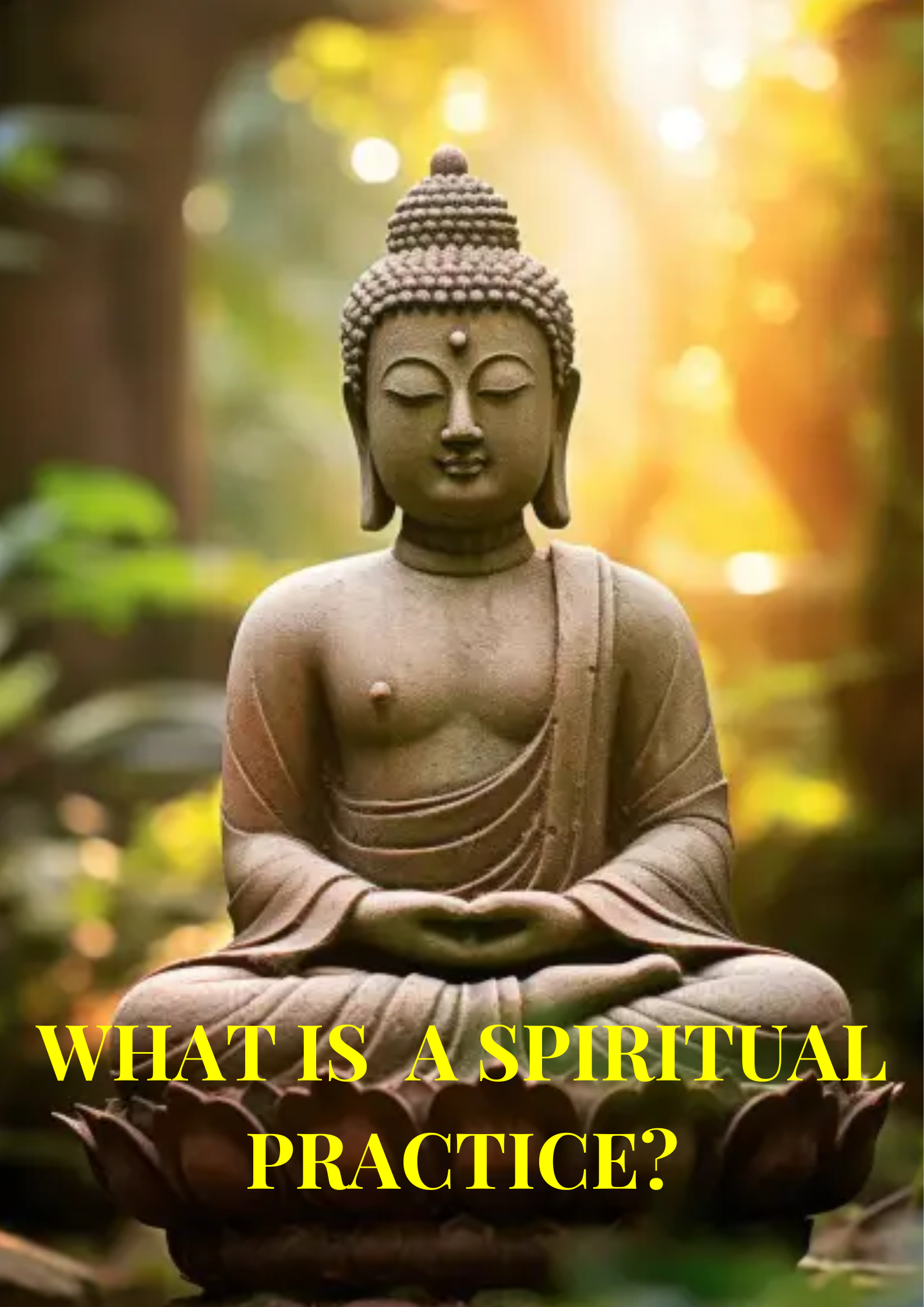Jump To Section
What is Spiritual Practice? Introduction

In today’s fast-paced world, many individuals seek deeper meaning and purpose beyond the materialistic aspects of life. Spiritual practices provide a pathway to achieve this, offering a profound sense of peace, understanding, and connection to something greater than ourselves. But what is spiritual practice, and how can you embark on your spiritual journey? This comprehensive blog will explore the essence of spiritual practices, their various forms, benefits, and steps to help you get started on your journey towards inner peace and personal growth.
Explore Further on Solitude: The Power of Alone Time: 10 Awesome Hacks To Harness Moments of Solitude for Clarity
A spiritual practice is a routine or activity that individuals engage in to cultivate spiritual awareness and growth. It involves intentional actions and habits aimed at nurturing the soul, enhancing one’s connection with the divine, and fostering a sense of inner peace and purpose. These practices can be rooted in religious traditions or be entirely personal and non-religious. The ultimate goal is to deepen your understanding of yourself and the universe, leading to a more fulfilling and meaningful life.
The Importance of Spiritual Practices
Understanding what is spiritual practice is crucial because it lays the foundation for your spiritual journey. Engaging in spiritual practices offers numerous benefits:

- Inner Peace and Calm: Regular spiritual practices can reduce stress and anxiety, promoting a sense of calm and tranquillity.
- Enhanced Self-Awareness: These practices help you gain a deeper understanding of your thoughts, emotions, and behaviours.
- Connection with the Divine: For those with spiritual beliefs, few practices strengthen your relationship with the divine or a higher power.
- Personal Growth: Spiritual practices encourage continuous personal development and self-improvement.
- Sense of Purpose: They provide a sense of direction and purpose, helping you to navigate life’s challenges with greater clarity and resilience.
Types of Spiritual Practices
Check This Blog: Present-Moment Awareness: 14 Awesome Techniques For Nurturing Motivation From Heart to Mind
Spiritual practices are diverse and can be tailored to fit your individual needs and beliefs. Here are some common types of spiritual practices:
1. Meditation

Meditation is a practice of focusing your mind and eliminating distractions to achieve a state of heightened awareness and inner peace. There are various forms of meditation, including mindfulness meditation, guided meditation, and transcendental meditation. Regular meditation can help you become more present, reduce stress, and enhance your spiritual awareness.
2. Prayer

Prayer is a spiritual practice common in many religious traditions. It involves communicating with a higher power, seeking guidance, expressing gratitude, or asking for help. Prayer can be a powerful way to connect with the divine and find comfort and solace in times of need.
3. Yoga

Yoga is a holistic practice that combines physical postures, breathing exercises, and meditation. It aims to harmonize the body, mind, and spirit, promoting overall well-being. Yoga can be both a physical exercise and a spiritual practice, helping you to develop greater self-awareness and inner peace.
Discover Mind-Body Connection: Unlocking the Mind-Body Connection: 6 Undeniable Strategies for Nurturing Mental Health for Improved Physical Well-Being
4. Journaling

Journaling involves writing down your thoughts, feelings, and experiences. It can be a reflective practice that helps you process emotions, gain insights into your inner world, and track your spiritual progress. Regular journaling can be a therapeutic and enlightening spiritual practice.
5. Mindfulness

Mindfulness is the practice of being fully present in the moment, paying attention to your thoughts, feelings, and sensations without judgment. It can be incorporated into daily activities such as eating, walking, or even washing dishes. Mindfulness helps you cultivate a deeper awareness of your inner and outer experiences, fostering a sense of calm and clarity.
6. Reading Sacred Scriptures

Reading sacred texts, such as the Bible, Quran, Bhagavad Gita, or other spiritual literature, can be a profound spiritual practice. These scriptures offer wisdom, guidance, and inspiration, helping you deepen your understanding of spiritual principles and connect with your faith.
7. Acts of Kindness

Engaging in acts of kindness and service to others is a powerful spiritual practice. It fosters compassion, empathy, and a sense of interconnectedness with others. By helping others, you also nurture your spiritual growth and well-being.
How to Start Your Spiritual Journey
Starting your spiritual journey can be a transformative and enriching experience. Here are some steps to guide you:
1. Define Your Intentions
Begin by reflecting on your intentions and what you hope to achieve through your spiritual practice. Are you seeking inner peace, personal growth, a deeper connection with the divine, or a sense of purpose? Clarifying your intentions will help you choose the right practices and stay focused on your goals.
2. Explore Different Practices
Experiment with various spiritual practices to find what resonates with you. You might start with meditation, prayer, or yoga, and gradually explore other practices such as journaling, mindfulness, or reading sacred texts. Be open to trying new things and see what brings you the most peace and fulfilment.
3. Create a Routine
Consistency is key to reaping the benefits of spiritual practices. Establish a routine that incorporates your chosen practices into your daily or weekly schedule. It could be as simple as dedicating a few minutes each morning to meditation or setting aside time each week for journaling or reading sacred texts.
4. Find a Community
Connecting with others who share your spiritual interests can provide support, encouragement, and inspiration. Look for local or online communities, groups, or classes that focus on your chosen practices. Engaging with a community can enhance your spiritual journey and provide valuable insights and connections.
5. Be Patient and Compassionate with Yourself
Spiritual growth is a lifelong journey, and it’s important to be patient and compassionate with yourself. There may be times when you feel stuck or encounter challenges, but remember that this is a normal part of the process. Be gentle with yourself, and allow yourself the space to grow and evolve at your own pace.
6. Reflect on Your Progress
Regularly take time to reflect on your spiritual journey and the progress you’ve made. Journaling can be a helpful tool for this, allowing you to track your experiences, insights, and growth. Reflecting on your journey can provide motivation and a deeper understanding of your spiritual path.
Overcoming Common Challenges
Embarking on a spiritual journey can come with its own set of challenges. Here are some common obstacles and tips on how to overcome them:
Read More on Happy People Habits: Exploring 10 Joyful Happiness Habits
1. Finding Time
One of the most common challenges is finding time for spiritual practices in a busy schedule. To overcome this, start with small, manageable practices that fit into your daily routine. Even a few minutes of meditation or mindfulness each day can make a significant difference. Gradually, you can increase the time dedicated to your spiritual practices as they become a natural part of your life.
2. Staying Consistent
Maintaining consistency can be difficult, especially when life gets hectic. To stay on track, set realistic goals and create a routine that works for you. Remind yourself of the benefits of your spiritual practices and the reasons why you started your journey. If you miss a session, don’t be too hard on yourself—just get back on track as soon as you can.
3. Managing Doubts
It’s normal to experience doubts or question the effectiveness of your spiritual practices. When this happens, remind yourself of the progress you’ve made and the positive changes you’ve experienced. Seeking support from a community or a mentor can also help you navigate doubts and stay committed to your journey.
4. Dealing with Distractions
Distractions can hinder your spiritual practice, making it difficult to stay focused. Create a dedicated space for your practices, free from distractions. You can also use techniques such as setting a timer, practising deep breathing, or using guided meditations to help you stay focused and present.
The Role of Self-Care in Spiritual Practices
Self-care plays a crucial role in your spiritual journey. Taking care of your physical, emotional, and mental well-being supports your spiritual growth and enhances your overall quality of life. Here are some self-care practices that complement your spiritual journey:
1. Physical Self-Care
Maintain a healthy lifestyle by eating nutritious foods, getting regular exercise, and ensuring adequate sleep. Physical health supports your mental and emotional well-being, making it easier to engage in spiritual practices.
2. Emotional Self-Care
Pay attention to your emotions and allow yourself to feel and process them. Practices such as journaling, talking to a trusted friend or therapist, and engaging in creative activities can help you manage your emotions and promote emotional well-being.
3. Mental Self-Care
Engage in activities that stimulate your mind and promote mental clarity. This can include reading, learning new skills, or practising mindfulness. A clear and focused mind enhances your ability to engage deeply in your spiritual practices.
Integrating Spiritual Practices into Daily Life
Learn More About Energy: Protect Your Energy: 7 Amazing Strategies to Mastering the Art of Emotional Boundaries
Integrating spiritual practices into your daily life can make your journey more meaningful and sustainable. Here are some ways to incorporate spirituality into your everyday routine:
1. Morning Rituals
Start your day with a spiritual practice, such as meditation, prayer, or reading a sacred text. This sets a positive tone for the day and helps you stay grounded and focused.
2. Mindful Moments
Practice mindfulness throughout the day by paying attention to your thoughts, feelings, and actions. Whether you’re eating, walking, or working, bring a sense of presence and awareness to each moment.
3. Gratitude Practice
Cultivate a sense of gratitude by regularly reflecting on the things you’re thankful for. This can be done through journaling, prayer, or simply taking a few moments each day to acknowledge the positive aspects of your life.
4. Evening Reflections
End your day with a spiritual practice, such as journaling or meditation. Reflect on your experiences, lessons learned, and any insights gained. This helps you process the day’s events and promotes restful sleep.
Conclusion
Understanding what is a spiritual practice and how to start your spiritual journey is a transformative step towards achieving inner peace and personal growth. Engaging in regular spiritual practices such as meditation, prayer, yoga, journaling, mindfulness, reading sacred texts, and performing acts of kindness can provide profound benefits. These practices offer a pathway to reduce stress, enhance self-awareness, deepen your connection with the divine, and foster a sense of purpose.
Explore About Forgiveness: The Healing Power of Self-Forgiveness: 13 Forgiving Yourself Books to Transform Your Life
Starting your spiritual journey involves defining your intentions, exploring different practices, creating a routine, finding a supportive community, and being patient with yourself. Overcoming common challenges like finding time, staying consistent, managing doubts, and dealing with distractions is essential for sustaining your spiritual growth. Remember, self-care is integral to this journey, supporting your physical, emotional, and mental well-being.
Integrating spiritual practices into your daily life can make your journey more meaningful and sustainable. Morning rituals, mindful moments, gratitude practices, and evening reflections can seamlessly weave spirituality into your routine, promoting a balanced and fulfilling life.
Embarking on a spiritual journey is not just about achieving specific goals but about embracing the process of continuous growth and discovery. It’s a lifelong commitment to nurturing your soul, fostering inner peace, and connecting with something greater than yourself.
What spiritual practices have you found most beneficial in your journey, and how have they impacted your life?
We invite you to share your experiences and insights in the comments below. If you’re new to spiritual practices or looking to deepen your journey, consider subscribing to our newsletter for regular tips, guides, and inspiration to support your spiritual growth. Join our community and embark on a transformative journey towards inner peace and personal fulfilment.





Pingback: From Pain to Peace: 7 Books on Healing Childhood Trauma and Building Resilience - True Potential Quest
Pingback: Finding Purpose in Retirement: 7 Awesome Ways Building a New Chapter of Meaningful Living - True Potential Quest
Pingback: Abundant Grace: 5 Tips to Unconditional Love & Acceptance - True Potential Quest